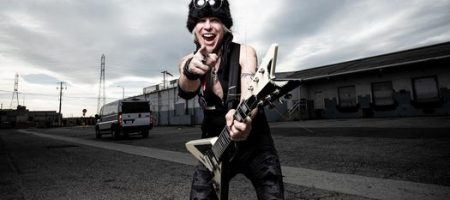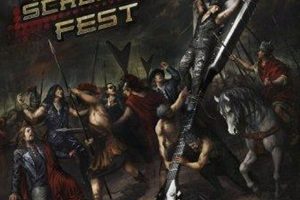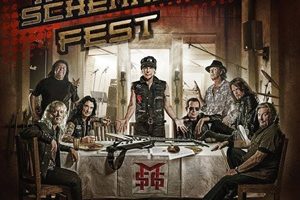Michael Schenker – Journey to Resurrection
Sunday, 18th March 2018
Premiere guitarists in the hard rock/metal realm don’t just fall out of the sky. Legendary through his unique single-string attack and tasteful riffing / lead play, Michael Schenker established his abilities in the 1970’s through his work with The Scorpions and UFO. Setting himself out on his own path through the 1980’s in MSG and during the subsequent decades in acoustic/electric instrumental realms beyond picking and choosing times to pop back into the group settings, it’s not surprising to see Michael come to terms with who he is and where he wants to go next. Which brings us to the Michael Schenker Fest and the latest album Resurrection.
Once again a celebration of the man’s impact on melodic hard rock and heavy metal, he’s created a studio album that features notable singers he’s worked with throughout his career like Gary Barden, Graham Bonnet, Robin McAuley and Doogie White. Axe players such as Lips and Kirk Hammett readily praise the man’s influence on their styles and outlook, and this record will be another most followers will praise. Reaching out over international phone lines, Michael appeared quite happy to discuss where he is at in terms of this ‘third stage’ of his career – so this half hour chat hopefully captures that reignition for the power of music and gaining another chance to showcase his talent in a solid group setting.
Dead Rhetoric: Resurrection comes on the heels of the 2016 Michael Schenker Fest tour, where you got to perform again with Gary Barden, Graham Bonnet, and Robin McAuley. How did you approach the songwriting and decision making for specific vocalists for this set of material- as Doogie White is also a part of the record?
Michael Schenker: Yes, it’s not a masterplan – but everything in my life is based on circumstances. I live in the now and I get inspired by the now. Temple of Rock was coming to the point of having to take a break because we had done this for four or five years- we had done two studio albums and two live CD’s/DVD’s. I suggested we take a break and the band members decided to go their own way. I looked at my favorite things I’ve done in my career- this is my third stage in my life. It is time for me to gather all my energy that I spread all over the place from the Scorpions to UFO, and the most popular times in my musical career but with different lineups and different singers. Like most bands have one band name or one lineup, and stick together for 40 years – but based on my circumstances I haven’t had that ability to keep people on retainer, there were years where I decided to just experiment with the music.
When people needed a job and I needed to make another album, I would have to look for different people. I realized for the last five years, Doogie was singing my most popular music. He started in 2008 when I was just getting over the stage fright that I had had my whole life. I wanted to be on stage, and this was my third stage of my career. I started to play the most popular music of Michael Schenker again. When we decided to make this break, I realized it is now time to collect my energy that I spread all over the place. All the songwriting with all of these various singers, and put things into one center point, and make it one band so I can perform this material with the original singers.
I focused on the 80’s, and all the singers Gary, Graham, and Robin were all ready to do this. We were able to bring the musicians together which included the original rhythm section on Assault Attack, and we got Steve Mann who was connected to the McAuley Schenker Group, he helped co-write “Anytime” with Robin. I had a really good lineup, they were all very happy. We started very slowly with a festival in Sweden Rock, and step by step we got offered three shows in Japan. I got offered a headline slot in the Loud Park festival in 2016, but because the Scorpions were playing the day before I passed on that. They asked me in 2017 if I was available- I got offered three shows, and I discovered this amazing venue and did a DVD out of it. I saw the potential of this undertaking.
When I put together the album, I started looking through my collection of riffs and writing songs. I get inspired by those pieces that I put down and discover. I got together about 20 songs – went into the studio with my co-producer Michael Voss and started to put the blueprint down. I want to make the music the way I see it as much as possible, it’s been a sign of pure self-expression since I was 17 years old. I put down the music, and Michael Voss worked on the lyrics and the melodies to my music. He was unbelievable, I didn’t want just three songs each for the singers, that would be too clinical- I wanted a couple of songs where all the singers would sing together. The second song I put out “Warrior”, he came up with this amazing melody that was suitable for all the singers – I was so happy. That started right in the beginning of our production, so we had so much time to get all the singers involved with a lot of time.
“The Last Supper” worked out that way too. The other songs, everyone found their pieces. Graham was focusing on something else, but we didn’t have two years to work on the material. I suggested to Nuclear Blast that we needed a schedule to have enough for the promotion. Michael went to Los Angeles where Robin and Graham are living, and Robin spent some time in Las Vegas too as he does a show there. They spent time completing their vocals there. Michael is a big fan of the 80’s, and knows MSG as well as the McAuley-Schenker periods. He was the best guy for the job, he understands everyone in the band – he felt this was the best work he has done. Graham Bonnet was happy with the songs he offered him “Everest” and “Night Moods”. It was a lot of work, and Kirk Hammett joined for a solo in “Heart and Soul”.
We had in mind a few more guests to join on this album- one was Apocalyptica and they were up to doing it, but we forgot that they were waiting for instructions for three months. And Dee Snider was another one, but his manager didn’t pass on the message. I had a song that was suitable for him, I ran into him at the Hard Rock Hell awards. He would have been honored to sing on the album – but we got Kirk and he wanted to record it in his studio in Hawaii. His management paid for the producer to fly over when it was recorded- I saw a few pictures of it where Kirk looked like a 19 year-old teenager with a smile on his face.
Dead Rhetoric: How did ‘The Last Supper’ style cover art come about? Do you enjoy the tongue in cheek aspects of it?
Schenker: The vision I had for the album cover turned out to be something completely different. We had Doogie singing “Take Me to the Church”, and I got the first artwork attempt my way, it looked like The Last Supper with him singing. It was turning a little bit religious, and I wondered how this would fit- so I started looking for a new title. I thought of Resurrection, because we are all back together, it’s almost like coming back from nowhere and uniting. Everyone liked the title, I wanted a name for the instrumental song so I called it “Salvation” and it was complete. Everybody lives on a different place in this planet, but we are coming up with these elements out of nowhere.
Dead Rhetoric: You are now a part of Nuclear Blast – which you initially resisted joining their roster. What circumstances or moments possibly changed your outlook to join this label, as they seem to have a strong respect and understanding of your work and your career outlook?
Schenker: I thought the potential of taking the Michael Schenker Fest into the studio would be a good idea. That’s when record companies started approaching me for a deal. It was funny the way I had it in my head- the Michael Schenker Fest in the studio, lots of food and drink in the studio. Nuclear Blast was the most attractive company, they have a good reputation and are very passionate people in the main company based in Germany. I decided to go with them, because this was a big undertaking. I decided to connect with this in a full way.
In the 80’s/90’s I was connected to an acoustic cable company that was selling CD’s on the side- with one leg in the loop. This was bigger, and I have changed as a person based on my middle years. I carry on now where I stopped in 1978 after Strangers in the Night – I experienced so much fame and success, I was able to make a decision if I wanted to stay up there or start a new chapter. I experimented with music, that became the second chapter in my life, and that made me ready for this, a celebration. We got the offer to do Loud Park in 2017, and I asked who was playing the first day and they said Slayer- so we decided to do it. That was a great show. It was time for this to go in the studio.
Dead Rhetoric: How do you feel about being considered one of the pinnacle guitarists/songwriters for the melodic hard rock/metal community?
Schenker: To be honest, I’m not really surprised because at this age and knowing what I know now and what I did, I didn’t recycle anything. I wanted to do something fresh, and as a result inspired many people to come up with their own material. It was never part of a trend. I never expected anything, when I got the first award for my playing, I was shocked. I heard all of these bigger bands that were influenced by me, and I found out about it much, much later because I never stick my nose into the scene and find out who is doing what. I stay in my own world and create. I was told by other people what actually happened- around the 1990’s I started to realize what had happened. The 90’s were the craziest for me, I completely split from the scene- I did anything that was coming my way.
I did MSG, UFO, The Scorpions, Deep Purple, we reestablished the UFO name with Walk on Water and Phil Mogg asked me to reestablish the band. I agreed if he gave me 50% of the name, so I got them a deal in Japan, a big one for UFO, all the original members including Ron Nevison as a producer. I was doing acoustic and electric instrumental albums, I did records with Mike Varney. Mike wanted me to do more UFO albums, but it fell apart because Phil reneged on his agreement. After three months it was the best-selling UFO tour, but he wanted more control. UFO is only good with the original lineup, but Mike wanted to do another album. For different reasons, my journey had many highlights in different ways, a musical way, and I put it together in such a way because who I am today is the sum of all these parts. I’m happy with how my life is constructed. I can do anything today- the stage fright is over.
Dead Rhetoric: What is more enjoyable these days: the creativity in writing and recording songs or the exchange of interaction and energy when performing on stage?
Schenker: I love it all together. It used to be you had more control over what you are doing in the studio, because you are creating from scratch. When you are going out to a live stage you are presenting what has already been created. But I love the sound on a bigger stage, it’s making things so much easier to know what you are doing versus small places where everything is bouncing back and you can’t really hear what you are doing. I love both ways, for me it’s become one big thing. It belongs together for me today. I have made my music contribution from the 70’s, into the 80’s – I never wanted to be famous, it all happened by itself. It’s fun playing, I focused on the art of the single string, lead guitar playing for self-expression. I created my own style and have had an effect on many musicians who became famous. That was my focus – to not recycle what has already been recycled. I decided to open up myself – that is what it is all about.
In 1978 when I finished Strangers in the Night and helped the Scorpions with the Lovedrive album, I opened the doors in America for them and I experienced all the fame. Did I need this fame though, or is it time for me to start a new chapter with music and life. When I look back I see three chapters of my life, it’s an incredible life structure or a life line. At my age looking back, in the middle I was “Into the Arena” – it was my time to do some real work. I kicked everything out of my system and cleansed myself. Dealing with life on the battlefield, but there was more to come in the third part – what doesn’t kill you, it makes you stronger. I am enjoying what I have created in my first part which I finished when I was 23. Everybody is celebrating right now, we all did our little journey in our middle years and we are all together and we are enjoying what we are doing.
Dead Rhetoric: What do you consider some of the benchmark career highlights- specific events, albums, songs, or special moments that remain forever etched in the memory banks?
Schenker: It’s one journey. It’s not even about the Scorpions or UFO- it’s all about what I wanted to create through the single string guitar and the art of lead guitar to developing it to its highest potential. The funny thing is it started with Lonesome Crow, went through UFO, and then Lovedrive. I can hear my progression from the albums, even with UFO and Force It, Phenomenon, Obssession, Strangers in the Night -I can hear every album that I made had a development as a lead guitarist. That is what I focused on – the crazy years of my second life, I did acoustic instrumental records, jams, I did all sorts of crazy stuff. I didn’t have any gaps- I put so many riffs on one record you could have made several records out of it. I was bubbling with creativity and I needed to get it out. It was experimentation time, and it would not have been good for any other band, or commercial band if I joined them- they would have hated me (laughs).
Dead Rhetoric: What are the long-term plans for yourself as far as recording and touring? It seems like you are always thinking a healthy amount in advance with what you want to do and accomplish…
Schenker: Not really, you see I don’t think that far in advance. It looks like that, but everything comes out of the moment. I didn’t know I was going to be doing a Michael Schenker Fest studio album, I never knew that we would be doing a DVD. That got inspired because of the Tokyo venue. Everything is inspired in the moment, and what is happening in the moment. Nobody knows what’s around the corner- I focus on the now. We will be touring in March in the USA, we will have a 2 ½ hour show with the four singers. It will be a celebration of the current and the past- something for everybody. We have booked shows up to 2019, there is no reason and no other time to make plans! (laughs)
Michael Schenker Fest official website

























